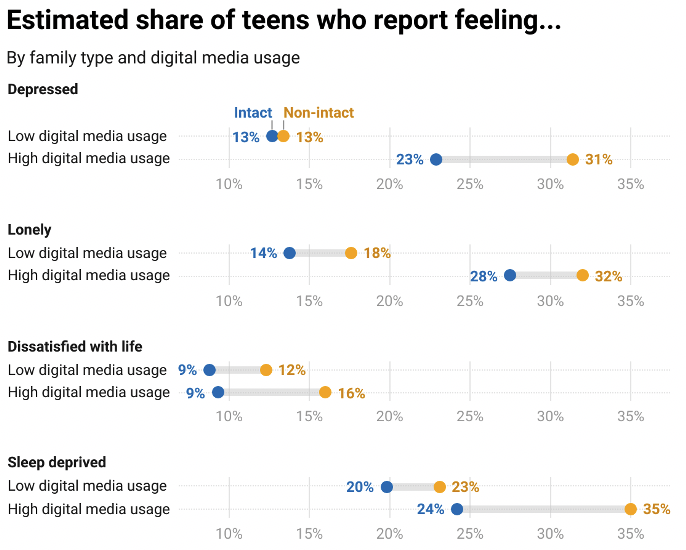New research has found that children from outside nuclear families are more prone to spending time online. The latest survey report by the Institute for Family Studies reveals that adolescents from non-intact families spent almost two hours more per day on their screens than teenagers who live in intact, married-parent families. Consequently, they spend more time on social media, texting, gaming, and a range of other online activities, compared to their peers from stable homes.
The survey of 1,600 US adolescents aged 11 to 18 also found that children from non-intact families — such as single-parent, step-family, and foster families — were also more likely to have their dinners interrupted by tech. Only 25% of teenagers in non-intact families reported that their families eat dinner together without media distractions almost every day, compared with 35% of teens in intact families.
These findings have disturbing implications. Teenagers from non-intact homes who were heavier tech users (devoting eight or more hours per day to screens) were also the most distressed in the sample of 1,600 adolescents. They were about twice as likely to be depressed, twice as likely to be lonely, and significantly more likely to be sleep-deprived, compared to their peers from intact families who were lighter tech users (spending less than eight hours per day on screens). For instance, after controlling for gender, age, race and mother’s education, only 13% of children who were lighter tech users were depressed (in either family type), whereas among heavier users 23% of adolescents from intact families and 31% from non-intact families were depressed. These findings thus indicate that both family instability and high levels of tech use are associated with greater emotional distress among today’s teenagers.

The research suggests that, amid growing public and scholarly concern about adolescent technology use, we also need to pay attention to the family contexts of such use. That’s because family instability is one fault line around which teenage devotion to screens, as well as the emotional fallout of too much time online, is separating our adolescents. Children from unstable families seem more susceptible both to losing themselves to virtual worlds and to paying a heavy psychological price for it. At the same time, the good news here for kids and parents in families of all types is that adolescent emotional problems are minimised when tech use is kept to a minimum.
Given the findings in this report, both parents and policymakers need to step up to address the challenges posed by technology today. Parents, including single parents, stepparents, cohabiting parents and foster parents, can take heart from the fact that lighter tech use dramatically reduces the odds that teenagers from all types of families end up with mental health problems. At a minimum, to rein in the role of tech in their teenagers’ lives, parents should take steps like postponing giving their child a smartphone until they are 16 or older, not allowing social media use until high school (or at all) and limiting hours spent on smartphones. Another useful step would be making sure that children turn in their phones at bedtime and thus aren’t tempted to use them when they should be sleeping.
Policymakers should also consider new steps to limit the role of Big Tech in our teenagers’ lives, like requiring that social media giants such as TikTok and Meta verify their users’ ages and get parental permission before allowing minors to use their platforms. Without such initiatives, the research suggests that large minorities of kids will continue to experience major psychological distress, especially when their lives have already been turned upside down at home.










Join the discussion
Join like minded readers that support our journalism by becoming a paid subscriber
To join the discussion in the comments, become a paid subscriber.
Join like minded readers that support our journalism, read unlimited articles and enjoy other subscriber-only benefits.
Subscribe